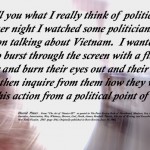photo by Bob Parker ©2008
Quoted from Milan Kundera, “The Book of Laughter and Forgetting” NY:Penguin Books, 1986 (p. 3)
To view a gallery of photographs of the APA Town Hall meeting, click here.
The Town Hall meeting following the APA Council of Representatives vote approving Substitute Motion 3 and defeating an amendment restricting psychologists’ roles exclusively to health care providers in (war on terror) detention centers was very spirited. The Town Hall was organized by the APA Convention Committee to provide a forum for APA members and others attending the convention (including media) to speak and to listen to thoughts, opinions, information, and data regarding critical issues affecting the reputation, identity, and role of psychologists and professional Psychology in a time of war and national upheaval. A number of attendees at the Town Hall spoke to the issues in a concerned, passionate, and informed manner. At one point early on, the meeting was marked by a major disruption due to the threatened forcible ejection of national media coverage by an APA official, if filming was not terminated according to a 10 minute time limit. This resulted in the breakdown of an otherwise orderly event and raised questions about the openness and transparency of the APA administration regarding the policy on interrogations and torture. The conflict was eventually resolved in favor of the media continuing full coverage, and the Town Hall proceeded without further interruption.
In the spirit of keeping APA members and other interested parties informed about psychologists’ involvement and APA’s policy in interrogations and torture, and out of a desire to contribute to the historical record, this posting includes an edited transcript, and a link to a complete (unedited) written transcript in pdf format, and a link to a complete unedited audio recording of the entire proceedings of the Town Hall meeting of August 19, 2007.
Below is the edited transcript of the Town Hall meeting. Not all speakers and comments are included here. The complete unedited transcript is available in PDF format here. A complete unedited audio recording of the nearly 2 hour Town Hall meeting is available via the audio player below, and at the end of the edited transcript.
To listen to an audio recording of the entire Town Hall meting, click on the yellow audio player below.
To play the media you will need to either update your browser to a recent version or update your Flash plugin.
Excerpts
Town Hall Meeting During Mini-Convention on Ethics and Interrogation
American Psychological Association, San Francisco August 19, 1007
DR. MOOREHEAD-SLAUGHTER:… Thank you so much for making time to come to this town meeting. I’m currently a part of BAPPI, Board for the Advancement of Psychology in the Public Interests. I chaired the PENS Task Force.
DR. HALDEMAN: …(W)hat had come to the Council agenda was a substitute motion from the Board of Directors that attempted to create a sort of compromise position, if you will, from what was initially the moratorium resolution. But, when we all got together we realized that there were a number of stakeholders who had yet to really sit down at the table and talk together and work out a solution to the question of psychologists’ involvement in interrogations in places where detainees are held without adequate or any civil rights and human rights.
The group that crafted the resolution that was ultimately passed today was one that included the Military Psychology Division, the Peace Psychology Division, the representatives from the Divisions for Social Justice, representatives from the New York State Psychological Association, and a number of other divisions, including Consulting and Counseling and some consultation as well from the Ethics Committee.
That resolution passed and is a document that is too long for me to summarize here, but included all collaboration between these groups with the exception of the clause that would be location-specific in terms of prohibiting psychologists from working at certain detention centers… although the resolution itself passed nearly unanimously, the Amendment itself brought a fairly divided sense to the Council of Representatives where there were many people who came down on the side of we withdraw completely from these kinds of settings because to participate implies a complicity as I understand it with governmental policies that we find abhorrent and unjust to people. There was, however, a larger group of people who felt that we stay engaged and that we cannot be helpful by not bearing witness and by offering whatever consultation and help that we can to people who are conducting interrogations.
DR. JACOBS: I’m Dr. Uwe Jacobs. I’m the clinical director of Survivors International, a rehabilitation organization for survivors of torture. I have done some work over recent months and further back to help with this process of bringing hopefully to pass resolution that would call for a stop to psychologists participating in military detention centers… The main point is that as a non-governmental organization which should be beholden to international law, nevertheless the APA has decided to side with this government and its own domestic laws where they diverge from international law… where we felt it was important to have in this resolution that the conditions of detention are identified, not just interrogation processes, that suggestion was taken back out. That’s only one example… But, the conditions of detention themselves have been called tantamount to torture by the ICRC and other observers…
DR. DAN ALBERS: My name is Dan Albers, and I am just another psychologist who thinks that the moral issue of our time has landed at our doorstep… I think that there has not been today, or in these last number of years, enough discussion about the difference between the culture of science and the culture of an intelligence community. Scientists are committed to openness. Ultimately what keeps us ethical is not our ethical code, is not our internal review boards, but it is that we publish our research, we present things at conferences, and ultimately, the last test on whether or not we have been ethical or not is public scrutiny. This is very different from an intelligence organization which tends to want to control information. And there are these basic incompatibilities, I think, we have not addressed… [T]his moratorium that did not pass. We have made an enormous mistake… not only did we do the wrong thing morally, we did not act in our best interests. We are now standing against the American Psychiatric Association, the American Medical Association, the British Psychological Society, numerous human rights organizations, the UN, the Council of Europe, and this detention and interrogation policy is going to go down. And once it does go down, we will find that we have secured the best cabin on the Titanic…
DR. MARK COVEY: I am Dr. Mark Covey out of Paynesville, Kentucky. I’m also a captain in the Army Reserve.
I was called up 2004 to 2005 to Germany at Landstuhl Hospital and then worked at brigade nearby at Baumholder. And during my time there I bumped into a problem. 2004, as you may recall, was the year that Abu Ghraib broke. I just happened to have been deeply affected by that, and talking to some of my colleagues, I think some of them were deeply affected by that as well. It prompted me to write an article on Abu Ghraib, taking it more from a psychological perspective… I didn’t realize at the time that I was hitting a major landmine because when it went through the review process in order to be approved for publishing, it was denied… it prompted me ultimately to write a book since the articles that I was attempting to publish I ran into some difficulties… that we are bound as military people under the Uniform Code of Military Justice, and so we can’t simply go out and publish when we’d like to; we have to go through that process… I think that it’s a major problem for people that are in the know that know what’s going on in the military circles that they are prevented from being able to speak the truth and to actually help modify things so that we don’t have to wait three years later for all of this to come out…
MS. GOODMAN (Journalist): Excuse me, just a point of procedure. We’re told that reporters are only allowed to record for ten minutes, and Pamela Willenz of the APA said that she will call Security on us now, because we’re going to be recording for more than ten minutes. So, I was wondering if there could be any sense of the meeting, or a rationale, since this is a town hall meeting, for not being allowed to record for more than ten minutes.
UNIDENTIFIED FEMALE 1: Can we vote to allow recording at the town hall meeting? Can we all vote to allow recording?…
UNIDENTIFIED MALE 2: It’s our town hall meeting. It’s our town hall meeting, isn’t it?
UNIDENTIFIED WOMAN 2: We want the press to witness this.
UNIDENTIFIED WOMAN 3: Yeah, absolutely.
UNIDENTIFIED MALE 3: No more crimes in silent.
UNIDENTIFIED MALE 2: No more secrecy.
UNIDENTIFIED WOMAN 2: Transparency, openness…
MS. CARLENAS: Can everyone who approves of allowing the reporters to record please raise your hand?
UNIDENTIFIED MALE (Dr.Haldemann or Dr. Behnke): Okay, folks, the recording will continue through the session.
[Applause.]
DR. ARRIGO: My name is Jean Maria Arrigo. I’m a social psychologist. For 12 years I studied ethics of political and military intelligence, working very closely with people from the military and intelligence. In particular, in November of last year I was one of the primary organizers of a seminar for psychologists and interrogators, one of whom I brought to this conference, Ray Bennett. And we have discussed intensively what interrogators, at least of his acquaintance, senior interrogators, want of psychologists. And their message was really unambiguous, which is that they wanted the assistance of psychologists at the training level, at basic training at Fort Huachuca, places like that, not anywhere in the detention center, and that was it. So, I’m here to bring the message from those interrogators…
LEN RUBENSTEIN: Hi, I’m Len Rubenstein… I’m with Physicians for Human Rights. I’m a friend of APA.
And what I’d like to do for a moment is talk about the fact that this resolution has been passed. There are elements in it that a lot of us don’t like and some of us do like. It is a quite a mix. But, the resolution has passed, and it seems that there are things the organization needs to do in response to the resolution.
There are three elements to the resolution that are particularly important. One is the condemnation of 20 specific interrogation techniques that we know have been used and probably are still being used by the CIA.
Second, it expresses grave concern over the fact that human rights violations are taking place in American-run detention facilities. And it recognizes that those violations include not only violations of interrogation, but in conditions of confinement. Those are all in the resolution.
So, what does the Association need to do? I’d like to suggest there are a few things that need to be done. One is absolutely, as the resolution calls for, to condemn the CIA for using these interrogation techniques and operating black sites where there is no due process, where people are kidnapped, where people are kept incommunicado, and where the ICRC is denied access. That follows first in the resolution. That seems a bottom line.
A second is while the amendment was defeated concerning participation in places where human rights violations have been committed, it seems that the Association, given the three points I just raised about what’s in the resolution, needs to say, what is a psychologist supposed to do in a CIA black site? What is the ethical guidance that the psychologist can get from this organization given the circumstances under which that facility is run?
Third, there are going to be hearings this fall by the Armed Services Committee in the Senate. And it seems to be — and concerning the roles of pyschologists, including SERE psychologists. And it seems the APA, given this resolution, has an imperative to publicly cooperate with that committee and provide whatever guidance and suport it can to its investigation.
Fourth, there are particular psychologists whose names we know who have been identified in the public who may or may not be members of the APA, often not, but that doesn’t seem to me to be relevant, that they need to be investigated by the APA on the basis of this resolution.
Finally, there has to be a way of moving forward with the general problem which was addressed in the amendment. And it goes back to the first point I made: how do you operate in an environment that is replete with human rights violations, sometimes gross violations, sometimes war crimes? These are not just violations of ethics, but they’re actually war crimes which can be prosecuted. And how psychologists — what guidance will be given to psychologists in those settings to make sure that they are not complicit in those abuses? I think that all follows from the resolution, and we at Physicians for Human Rights will be delighted to work with the Association, moving forward on all five counts.
DR. NEIL MASSOTH: Neil Massoth. Just two quick things. part of the resolution that was passed was reaffirming that the Ethics Committee will be writing a case book to help psychologists with these ethical dilemmas… I think some of the questions about what was done in the resolution is being lost in some of the feelings about the one amendment that was not passed…
DR. JACKSON: …I’m Mary Ann Jackson. I’m from New York, and I’m active in NSPA… I took the time to chat with people on the bus…and I was really amazed at how many people didn’t know or kind of just vagely knew what was going on here… I was very dismayed to see how few psychologists at this convention — I heard that there are 15,000 of us, and yet there are only a couple of hundred here — how few of them either knew the issue or understood the issue or were concerned enough to find out about the issue. Now, of course, there’s the additional problem that the population in general doesn’t know too much about this, and I’m very glad to see the press is here to record this… But, I think that many, many of our members just didn’t know or only knew very slightly what was going on, and I’m very upset about that. I feel that our organization has to be more transparent…
MR. AHRENS: My name is Mike Ahren. I’m retired, been retired for eight years from University… I can tell you that some of the psychologists that I’ve known in Europe do know about this. They do read the newspapers… This is a reflection on everybody in psychology everywhere in the world. So, decisions that you are making right here are reflecting on the entire field…
DR. CARTER MEHL: I’m Carter Mehl. I’m a psychologist… I just retired a few months ago… I’m one of the people…who was not aware of all this very much… I don’t know quite where I stand on all of this, but I have to say I am more troubled by the fact that was stated that I don’t feel that the leadership of APA made this very well known among the membership… I was most disturbed by Jean Arrigo’s comments about her experience and the process of how the PENS report came about.
And I have to say I’m most disturbed at this meeting now about what we just experienced, about the press was going to be cut off. Why are we being secretive? I understand why the CIA needs to be secretive. We are a public organization. And I would like someone from APA leadership to explain their rationale, why they thought a town meeting like this should be cut off, that the press should be excluded after ten minutes…
DR. HALDEMAN: Is there someone from the staff who would like to respond to this? I mean, I would like to respond to it I suppose if I had known it existed, but…
UNIDENTIFIED MALE: What do you know?…
DR. HALDEMAN: Not very much. I did not know until this session started that there was a ten-minute limit on press coverage of these sessions.
UNIDENTIFIED FEMALE and MALE: Why?
DR. HALDEMAN: And I am sorry, I cannot explain this to you because I don’t know why.
UNIDENTIFIED FEMALE: Who [inaudible] that from? Who told you?…
DR. HALDEMAN: The reporter here. So, [inaudible] and I’ve got the microphone. We’re highlighting some other communication problems within the Association, seriously, because I truly don’t know how to explain this to you. I didn’t know it existed.
UNIDENTIFIED FEMALE: Well, doesn’t someone?
DR. HALDEMAN: But it’s been resolved satisfactory.
UNIDENTIFIED MALE: But, can I ask a question? Can I ask that you find out where that came from and then put an announcement on the APA website explaining it? Because it is now national news. I think it’s a matter of transparency, face-saving. Explanation is all part of the process of trying to keep this very important issue active and alive so we can all address it as professionals.
DR. HALDEMAN: I will put it at the top of my to-do list, sir…
DR. REISNER: I think it is very important that there are decisions being made and nobody seems to know who made them. My name is Steven Reisner… I wanted to ask this group a question. I wanted to take another vote. The Amendment states that psychologists should not be participating as part of a military operation or a CIA operation at sites where human rights are being violated. And I would like to know in this room how many people would support such an amendment? How many would be opposed?
UNIDENTIFIED FEMALE: What are the parameters?
UNIDENTIFIED FEMALE: Read the Amendment.
DR. REISNER:… This is the wording. “Be it resolved that the objectives of the APA shall be to advance psychology as a science and profession and as a means of promoting health, education and welfare. And, therefore, the roles of psychologists in settings in which detainees are deprived of adequate protection of their human rights should be limited as health personnel to the provision of psychological treatment.” How many are in favor? How many are opposed?
I want to know why the Council of Representatives is so different in how it votes from the members of the American Psychological Association.
My second question, following up on what Len Rubenstein asked… if we take this resolution seriously, where we are as an organization. I want to know — and there are ethicists in this room, there are people who were involved in the careful wording of this resolution — if passing this resolution prohibits psychologists from being involved in the enhanced interrogation techniques that the President of the United States authorized can take place at CIA black sites. Enhanced. The APA leadership…has said that the APA only wants to use rapport-building interrogation techniques and that these techniques do no harm. Yet the President has authorized enhanced techniques, which means that they are more aversive than those techniques that are approved even in the Army Field Manual, which are no picnic. And I want to know from people here who know, the ethicist psychologists in this room who worked on this language: does this resolution prohibit psychologists from participating in enhanced interrogations at CIA black sites?…
DR. SOLDZ: My name is Stephen Soldz from the Coalition for an Ethical APA… We have been told throughout the day, throughout the week that the APA has an unequivocal policy against torture. There is no doubt that torture is occurring in the CIA black sites. We may have some questions about what’s going on in Guantanamo these days because we know very little about the interrogation. But, we know that the President has reauthorized torture. We need the leadership of the APA to state unequivocally that it’s unethical for psychologists to participate in these enhanced interrogation techniques. That will be the measure of whether we got a real resolution here, or did we get stabbed?… there is a minor detail in here that has certain implications that were not discussed in Council today, that have not been discussed at all that I think we as psychologists need to know because this resolution throws out Principle A of the Ethics Code. In the list of the techniques on Lines 97 to 98 it says, “An isolation sensory dep…” — this is a list of banned techniques. “Isolation sensory and/or sleep deprivation used in a manner that represents” — they changed “severe” to “significant pain or suffering or in a manner that a reasonable person would judge to cause lasting harm.” So, all of a sudden the APA has voted that it is not unethical to cause any level of harm less than significant pain or suffering or something that does not cause lasting harm. This I think is a black day for the profession of psychology and for ethics in psychology.
DR. MIKE WESSELS: My name is Mike Wessels , and I just wanted to say that we’re talking about a lot of the particulars of the resolution, which I think is terribly important… if you read carefully the APA Code of Ethics, which was not sculpted to address international issues, one finds a discrepancy, a contradiction that actively undermines psychologists’ commitments to international and human rights standards.
It goes like this: “We support human rights principles of beneficence and non-maleficence do no harm.” So far so good. Continue reading down. “When there is a conflict over ethics, the psychologist can take active steps to resolve. And if those steps don’t provide an easy resolution or maybe a difficult resolution, it is within the purview of the psychologist to follow national law.”… The way that the Suddam Husseins of the world and the tyrants of the world get their warrant to torture is by saying national law trumps international and human rights standards. The power of international and human rights standards derives precisely from the fact that no state and no military can trump them… We need to change the Ethics Code to bring ourselves in line with international and human rights standards… The second point is that every time international and human rights standards are compromised, it is not just that harm gets done. It is that the international movement to establish human rights standards are actively weakened. The APA took such a step today by ruling that psychologists could potentially continue to be active at Guantanamo Bay and at other sites operating outside the Geneva Conventions…
DR. FALLENBAUM: The issues around Section 301 or whichever — now I’ve forgotten what the section was — 102 — 1.02… and the entire changes in the Ethics Code from 2002, all the language…the missing clauses, the changed words, the resolutions, the amendments, the votes, the machinations have led me to feel very strongly that there needs to be some house-cleaning and some exploration and investigation into the whole ethics apparatus of the APA. The fact that it has taken, you know — the press has taken a bunch of — a rag-taggle bunch of busy psychologists to bring even the resolution that we’re getting, which is sort of flawed, when we’ve got someone apparently, you know, paid to do ethics, a whole committee of ethics people for the APA, who have given such poor consultation to this organization and then led us into this abyss of shame and, you know, just something we ought to feel absolutely appalled by I think means that we need some house-cleaning here.
DR. MASSOTH: …my proudest moment as a psychologist were my three years on the Ethics Committee… One of the last speakers referred to, quotes, “all of the changes that have been made since the 2/02 Ethics Code.” There have been no changes made… let’s not confuse the Administration and the APA Ethics Committee… The Ethics Committee does not have the power to rewrite the Ethics Code. The Ethics Committee probably wishes they could insert some language in 1.02. It would solve some problems… When the membership of APA decides that the time has come for a new Ethics Code, committees are brought together and there is a whole process… It’s out for public comment. It goes out for public comment again. It’s a multi-year process… The section that refers to when this conflict between law and the Ethics Code, go with law, was written because our Ethics Code says you can sleep with patients after two years, even though I’m not so sure that’s a good idea, cautions you to think about the patient in doing no harm… But there are some states that say you got to wait longer. So, you have to go with your state in violation of our Ethics Code. That’s why that’s there…
DR. SUMMERS: Hello. My name is Frank Summers… The fact is that two years ago the Council of Representatives voted to change the Ethics Code. They called on the Ethics Office to change the Code. Nothing has been done, okay?… I think people should understand that 1.02, which is a basic source of conflict for many of us…does allow one to follow orders and violate the Ethics Code under that condition. But, there was language in this Amendment as I saw it yesterday that said that this would contravene any law or any order given. I don’t see that in here today. How did that get taken out? When did that get taken out? Why did that get taken out?…
Now, my question is, how is it possible to be ethically involved in a situation where there are no basic human rights, where there is no due process, where there are none of the protections of the law that we enjoy here? …
…The United Nations Commission studied Guantanamo, and what they said was that there was widespread use of techniques that amount to torture under international law, that healthcare personnel were complicit in the use of those techniques, and that they had deleterious effects on the mental health of those people, and that there were in the year 2003 alone over 350 acts of self-harm…massive suicide attempts…massive hunger strikes. Where were the psychologists? Where were these psychologists that are making these interrogations safe, ethical and legal?
DR. BEHNKE: My name is Steve Behnke. I’m director of the Ethics Office of the American Psychological Association… Dr. Summers said that Council had directed the Ethics Committee to change Ethical Standard 1.02. In fact, that is not correct; that is not what Council directed the Ethics Committee to. And I would really just encourage people please read these texts… there is much difference of opinion about what APA should do… I hope I can say that it is a positive step in the right direction. I know that it does absolutely not go as far as many people think APA ought to go, but I do think I can say on behalf of the Association that we can all agree it is a step in the right direction…
… I just want to read one passage from that: “Be it resolved the American Psychological Association affirms that there are no exceptional circumstances whatsoever, whether induced by a state of war or threat of war, internal political instability or any other public emergency that may be invoked as a justification for torture or cruel, inhuman or degrading treatment or punishment, including the invocation of laws, regulations and orders.”
UNIDENTIFIED MALE: Stephen, see, does that trump 1.02 in the case of torture?
DR. BEHNKE: It’s very clear, there is no… No justification… whatsover.
UNIDENTIFIED MALE: What about CIA black sites? Enhanced interrogation at CIA black sites?
DR. BEHNKE: The list that was contained in the resolution had two sources… One source, again, was a letter that Len Rubenstein… The other panelist was Professor Alfred McCoy, and I’m quite sure that many of you are familiar with Professor McCoy’s book, “A Question of Torture.”… [A]t the Wright Institute he laid out a history of torture, and he said that if you take a look, there are certain tenchniques that appear, that continue to surface across time and across context… they bear a very close resemblance to the specific techniques that Len Rubensten wrote to the APA saying you must identify these specific techniques as constituting torture… the message came across very clearly from both Professor McCoy and for the audience that APA’s next step must be to specify specific techniques that are always prohibited. That’s what APA did this morning… it says is that, that this unequivocal condemnation includes all techniques defined as — and then it says, “This unequivocal condemnation includes, but is by no means limited to,” so that there are specific techniques identified, but that is not a closed set, very explicitly not a closed set.
One final point about the resolution… It says: “Be it resolved that the APA Ethics Committee shall proceed forthwith in writing its casebook and commentary that shall set forth guidelines for psychology that are consistent with international human rights instruments.” And then it actually specifies what those instruments are. The first is Common Article 3 of the Geneva Conventions.
And one of the things that the Ethics Committee is going to be talking about — and I know that there’s been discussion about the Ethics Code revision… The current language in Ethical Standard 1.02 was written in the fall of 2000 before September 11, before the terrorist attacks. It bore no relationship whatsoever to this Administration, to the global war on terror. Those are two completely separate issues. The language was already set at that point in time…
UNIDENTIFIED MALE: Would you explain why the reporters had only ten minutes?
DR. BEHNKE: You know, let me — I don’t know the origin of that rule. I simply don’t know it, but —
UNIDENTIFIED MALE: Why don’t you know it?
DR. BEHNKE: Why don’t I know that rule? That is an excellent question. I don’t know. But here’s someone who does know that rule…
Dr. MOOREHEAD-SLAUGHTER: I can just speak to the camera’s rule… We often have less space for cameras than we have crews wanting into a session. So, in fairness we try to rotate every ten or 15 minutes to allow crews to come in. That’s not the case in this room, so the rule was changed, and everyone has full access.
UNIDENTIFIED MALE: I think you need to change the rule permanently. It’s not been the case in any room in this whole convention.
DR. LERMAN: I’m Hannah Lerman. I identify primarily as a feminist psychologist and personally was involved in not the most current Ethics Code revision, but the two previous ones… I have heard APA described at various times one as Byzantine with structures being formed on structures. More apt to me, however, was regarding the APA structure as an amoeba. Poke one of the pseudo-pods and it responds, but the action doesn’t translate into the whole rest of the structure… either we have to talk about whether you want to work on a large process of changing how APA members are represented in the larger organization — in the governance of the organization or you need to join the subdivisions through which you can make your vote known…
MR. RAYMOND: My name is Nathaniel Raymond. I work for Physicians for Human Rights… as my colleague, Len Rubenstein, mentioned, there’s an investigative process going on in Washington in the Senate, and there is a series of disclosures which have happened in the media and also through the Inspector General’s Office of the Department of Defense… We’re not talking about bad apples. We’re not talking about psychologists who are acting independently or individuals within the chains of command of CIA or DoD acting independently. We’re talking about a government which since after September 11th has created a systematic regime of psychological torture with the assistance of mental health professionals and mental health expertise… The language that was passed in reference to the tactics is not exactly as we had initially written it from PHR… [W}e feel that from a legal and ethical perspective one message has to be clear: These tactics prohibit what we know of the CIA enhanced interrogation program… The APA needs to advocate actively in Washington to say psychologists and psychological expertise cannot be used as a weapon that violates the law, the ethics, and the Geneva Conventions.
DR. SAND: Hi, my name is Shara Sand… On May 18th, 2007 the Office of the Inspector General of the Department of Defense released its investigative report… And to my knowledge it’s the only place where there’s actually an indication that psychologists perhaps have been involved in the development of these techniques…
“Between June and July 2002 the Chief of Staff of the Joint Personnel Recovery Agency, the agency responsible for organizing SERE training, working with the Army Special Operation Command’s psychological directorate, developed a plan designed to teach interrogators how to exploit high-value detainees. The Chairman of the Joint Chiefs of Staff in September 2002 recommended that the Federal Bureau of Investigation Behavioral Science Unit, the Army’s Behavioral Science Consultation Team, and the Southern Command Psychological Operations Support Element, the group at GITMO, and JTF 170 clinical psychologists develop a plan to exploit detainee vulnerabilities.” Once again, this is the government speaking, not me.
“On September 16th, 2002, the Special Army Operations Command and the Joint Personnel Recovery Agency co-hosted a SERE psychologist conference for JTF 170 interrogation personnel. The Army’s Behavioral Science Consultation Teams, BSCTs, from Guantanamo Bay also attended the conference. The JTF 170 personnel understood that they were to become familiar with SERE training and be capable of determining which SERE information and techniques might be useful in interrogations at Guantanamo. Guantanamo Behavioral Science Consultation Team personnel understood that they were to review documentation and standard operating procedures for SERE training in developing the standard operating procedure for the JTF 170 if the Command approved those practices.” They also supported a SERE psychologists competency area.
My question is, why has APA not addressed exactly what is said in this report, which does indicate that there has been some psychological involvement in these practices?
DR. ALBERS: … If I am a member of BSCT that is working under the direction of the CIA and I am told to waterboard somebody, and I have made efforts to resolve the conflict between this resolution and the — what I believe to be U.S. law, may I then choose to adhere to U.S. law and, therefore, waterboard?
DR. BEHNKE: You may not.
DR. HALDEMAN: No.
DR. BEHNKE: It’s unethical. It’s prohibited and it’s sanctioned…
UNIDENTIFIED MALE: I’ve looked at the text. We were told to look at the text of the resolution, and I’ve come to the conclusion that the winner today, were the people who backed the KUBARK style of interrogation, and the losers today, were those who backed the SERE style of interrogation. And the playing field was the APA. The SERE — the resolution which condemns a number of different types of participation in — or different techniques of torture that were absolutely banned, which as Dr. Behnke pointed out as waterboarding, rape, simulating drowning, mock executions, cultural and religious humiliation, these were the landmark techniques of the SERE style of interrogation and torture. KUBARK, which means CIA, which developed over a period of 50 years, a style of torture is based on sensory deprivation, isolation, hypnosis, and the induction of debility and including sleep deprivation. You’ll see that division in the resolution because those things are not prohibited as conditions of detention. They’re prohibited as conditions to be used in interrogations. But, you see, they don’t use sleep deprivation while they’re interrogating you. They use it before they interrogate you as part of the conditions of detention to soften you up for the interrogation.
So, the winner today, and I’m sure their lawyers are very happy, is the CIA, and I think that’s why it is so important to see how the APA is going to react to the question of the enhanced interrogation techniques. But, I would say not just the interrogation techniques, but the entire use of these techniques in the secret sites, including the detention conditions, because otherwise it’s a farce…
DR. OLSON: Hello, everyone. I’m Brad Olson. I’m the chair for Divisions for Social Justice. We’re 13 divisions of the American Psychological Association working together to put forth and make sure that social justice becomes a central part, not just an ethics in interrogation issue, but absolutely every component of the APA… everybody has been so tough and yet good-hearted in here today. But, you know what? Psychologists, we know that reinforcement increases the probability of behaviors. And we need to remain vigilant, and we need to make sure there’s action on this — the good parts of this resolution that happened today. But we also need to reinforce the people who helped set up this mini-convention within the APA and who are holding this town hall, and sometimes funny things go on, ten minutes with the camera, but some beautiful social action nipped that in the bud, and that’s what we just need to keep on doing again and again and keep pushing through until the end.
Now, today I was told that — I was just at a Division for Social Justice meeting, and I was told that — I have very mixed feelings about what happened today, I think mostly positive. But, a couple of council members said that they were threatening DSJ with removing the Division because of our tactics. Well, I don’t know what our tactics are other than authenticity and honesty… I mean, we’ve taken Linsky’s roles and said, no, those are not right. But we need to keep pushing and we need to just make sure that we’re positive, too. And I would really like everybody to thank the APA members who are here, thank the military who are going up at those different sessions in the mini-convention. It’s not always easy to hear this for them. And I’ve learned a lot from them. And we all need to keep talking and keep working together. So, let’s thank Steve Behnke and Dr. [inaudible]. Thank you.
DR. HALDEMAN: Thank you for coming. We are at our time. But we are certainly in an evolutionary point in our discussion and in the process of all this.
[SESSION END]















For psychologists to remind themselves of earlier decisions and questions APA has yet to answer. Please read and speak with your Council Representatives about this important and likely contentious issue that will be raised at the February COR Meeting.